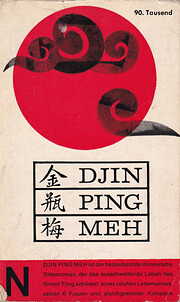

Click on a thumbnail to go to Google Books.
|
Loading... Djin Ping Meh (1956)by Wang Schi-Dscheng (Author), Artur Kibat (Translator), Otto Kibat (Translator)
Work InformationThe plum in the golden vase, or, Chin Pʻing Mei by Lanling Xiaoxiao Sheng (Author) (1956)
 No current Talk conversations about this book. no reviews | add a review
4-volume boxed set. The Golden Lotus, which Pearl S Buck has called 'the greatest novel of physical love which China has produced' was first published in England in 1939. It is now published unexpurgated, giving for the first time a complete and full translation into English. The character of the book is such that it must inevitably be studied by those interested in the cultural history of China. It is a national work in the sense that the Decameron, the Arabian Nights, and the Canterbury Tales are national works. The Golden Lotus is a picture of family life in a polygamous household, told with an extreme frankness and wealth of detail for which it would be hard to find a parallel in any other piece of fiction into the world. No library descriptions found. |
Current DiscussionsNonePopular covers
 Google Books — Loading... Google Books — Loading...GenresMelvil Decimal System (DDC)895.1Literature Literature of other languages Asian (east and south east) languages ChineseLC ClassificationRatingAverage: (3.67) (3.67)
Is this you?Become a LibraryThing Author. |
||||||||||||||||||||||||||||||||||||||||||||||||||||||||||||||||||||||||||||||||||||||||||||||||||||||||||||||||||||||||||||||||||||||||||
Ez a könyv egyébként is lényegesen „európaibb” olvasmány, mint közvetlen előzményei, a Vízparti történet, vagy a Nyugati utazás. Van lineárisan rajzolható története, (viszonylag) behatárolható számú szereplőket mozgat, akik önálló karaktert kapnak** – bár a jellemábrázolásnak azért azt a fokát nem éri el, amit a nyugat-európai prózában megszokhattunk. Ezek az elemek meglepően jól olvasható, „haladós” szöveggé teszik a könyvet, ugyanakkor megmaradnak azok a kínai prózára jellemző ízek, amikért az ínyencek rajonganak: a szépség és a forma mélységes tisztelete. Élvezetes, tartalmas, tanulságos könyv, helyenként igazán átélhető atmoszférát teremt, jól szórakoztam rajta. Bár a kínai neveket továbbra sem tudom megkülönböztetni egymástól.
(Megjegyz.: Mátrai Tamás fordítása egy német szövegből készült, aminek nyilván megvannak a hátrányai. Például a buddhista szerzetesek leírásánál a katolikus terminológia kifejezései bukkannak fel, úgymint klastrom vagy novícius, ami minimum félrevezető. Érdekes lenne tudni, egy eredeti nyelvből történő, rigorózus magyarítás mennyiben változtatná meg a szöveg hangulatát… esetleg ez az „európaiság” csak illúzió, egy fordítói koncepció, nem pedig a szöveg eredeti jellemzője…)
*Amúgy a cselekmény hivatalosan a XIII. században játszódik, de ez meglehet, csak írói trükk – ismeretlen tollforgatónk talán szándékosan antedatálja a történetet, hogy bátrabban beszélhessen a jelen problémáiról.
**Ami értelmezésemben azt jelenti, hogy jóízűen lehet utálni őket. Itt van például ez az Aranylótusz. Tisztára Merteuil márkiné a Veszedelmes viszonyokból. Ronda dög. (